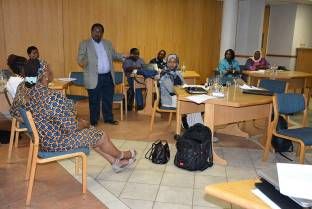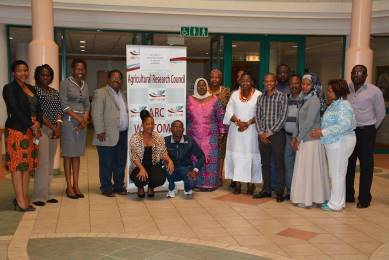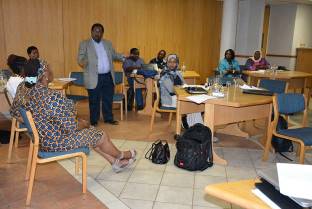
Empowering Women in Agriculture through SIMLESA
CIMMYT’s Sustainable Intensification of Maize-Legume-based Cropping Systems for Eastern and Southern Africa (SIMLESA) project and the Agricultural Research Council (ARC) of South Africa hosted a five-day gender training workshop on 24-29 August in Pretoria, South Africa.
Called “Situating Gender in SIMLESA”, the workshop aimed at increasing awareness of gender issues in agricultural research and development, and identifying practical solutions to integrate gender into SIMLESA. It brought together a core team comprised of SIMLESA’s project leader, project manager, gender focal points, monitoring and evaluation specialist, communications specialist, and country coordinators. In his opening remarks, Litha Magingxa, ARC Group Chief Executive (Agri-Economics and Capacity Development), commended SIMLESA for the gender training.
Working closely with the ARC, CIMMYT gender specialist Vongai Kandiwa provided technical training to 14 participants on gender analysis tools, leadership skills, and competencies. Given the coordination role that SIMLESA gender focal points play within countries, it is essential that they have solid interpersonal and leadership skills, in addition to their gender expertise.
“This is a particularly exciting workshop because it demonstrates a strong commitment by CIMMYT and SIMLESA to actively invest in building skills and finding practical ways of integrating gender into ongoing activities,” said Mulugetta Mekuria, SIMLESA Project Leader. “The workshop has highlighted some of the gender-based constraints that women and men face when they try to adopt, adapt, and benefit from sustainable intensification options. This is a critical first step to improving gender awareness and equality in the rural smallholder agriculture sector where SIMLESA operates.”

Of the poor who depend on maize for their livelihoods and food security in East and Southern Africa, more than half are women and girls. Although women play a crucial role in farming and food production, they often face greater constraints in agricultural production than men. Rural women in East and Southern Africa are also less likely than men to own land or livestock, adopt new technologies, access credit and financial services, and receive education or extension advice, according to the Food and Agriculture Organization of the United Nations.
Participants discussed challenges and opportunities to embed gender within the relevant SIMLESA work sub-objectives. They collectively identified gender entry points, specified monitoring and evaluation indicators, and agreed on an effective accountability framework. They also agreed on what should be done across all SIMLESA countries in diverse areas such as socioeconomic research, strategic gender research, and participatory selection of alternative sustainable intensification options, and seed systems.
As Kandiwa told the participants, “Careful integration of a gender perspective into the research process ensures that maize and legume research for development leads to positive and substantive outcomes.”
The participants were expected to return to their respective workplaces and apply the knowledge and skills they gained at the workshop. Almost immediately, country coordinators will work closely with objective coordinators and gender focal points to ensure gender relevant activities are budgeted for during SIMLESA’s annual planning meetings, effectively implemented, and accurately reported. The ARC undertook to develop a gender capacity building strategy for SIMLESA.
In SIMLESA II (2014-2018), the aim of gender integration is to consolidate the gains made during SIMLESA I (2010-2014). Through the Association for Strengthening Agricultural Research in Eastern and Southern Africa (ASARECA), SIMLESA I strengthened the capacity of more than 1, 000 individuals by providing gender-sensitive training at times and places that were convenient for both men and women, to ensure equal access to the skills and knowledge needed to succeed in agriculture.
Additionally, ASARECA documented in-depth case studies to improve SIMLESA’s understanding of the best practices for gender analysis and development. SIMLESA II is poised to build on this foundation and integrate gender effectively.

Johnson Siamachira